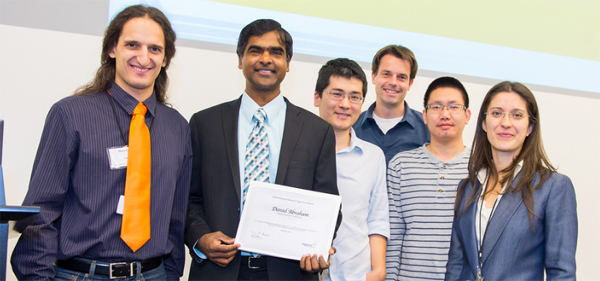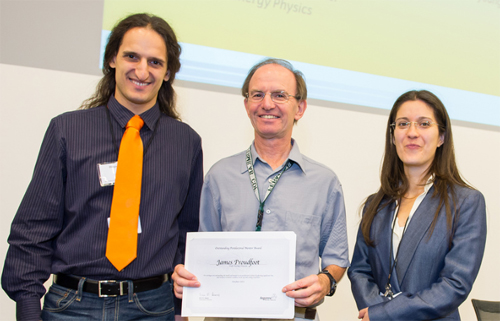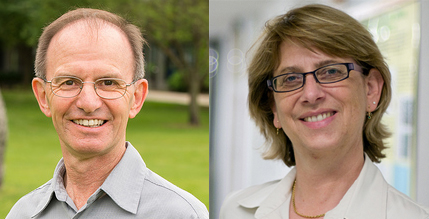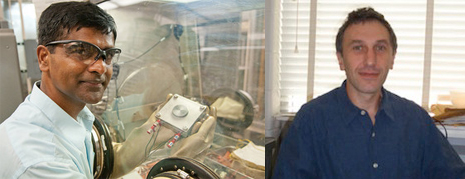In Their Own Words — Postdocs Relate What They Value in Mentoring Through Award Nominations

The Inaugural Awards for Outstanding Postdoctoral Mentor and Outstanding Postdoctoral Supervisor were presented at the 2013 Postdoctoral Research and Career Symposium. Lessons learned are an integral part of the scientific process at Argonne—from working safely to process improvement. As this was the first awards program for Postdoctoral mentors and supervisors, there are many great lessons learned from postdocs being pace setters for employee recognition, eliminating bias from selection processes and in their own words, what qualities comprise a good postdoctoral mentor or supervisor.
The Postdoctoral Society of Argonne (PSA) spearheaded an initiative to propose and garner support for the awards, outline the criteria for eligibility, and define the nomination and selection processes. The PSA mentoring committee, led by Laura Zamboni (MCS) and Diego Fazi (CSE) made the case for establishing the awards program as a way to recognize and foster good mentoring practices at the laboratory. With support from the Office of the Director and the Postdoctoral Program Office, a call for nominations was launched in August.

Postdocs could nominate their direct supervisor for the Outstanding Postdoctoral Supervisor Award or a third-party mentor for the Outstanding Postdoctoral Mentor Award. The selection criteria recognized the nuances between supervisors and other mentors and reflect the qualities that postdocs seek in trusted advisors.
Outstanding Postdoctoral Mentor displays the following qualities:
- Boosts curiosity, passion and performance
- Takes an active role in postdoctoral mentoring by maintaining an open line of communication, is available to meet with postdocs, creates a supportive environment and helps postdocs assimilate into the Argonne culture
- Advocates for postdocs inside and outside the lab – for example, someone who nominates postdocs to give talks or receive awards
- Encourages development of important skills such as communication, leadership and networking
- Discusses paths to career opportunities without bias and supports career transitions
In addition to the above criteria, an Outstanding Postdoctoral Supervisor:
- Encourages postdocs to attend conferences to boost their future career and make their work known to the wider community
- Provides the postdoc with opportunities to explore scientific interests, within funding constraints
- Encourages and enables discipline-specific skill development (such as learning new techniques, training on unfamiliar equipment, identifying funding opportunities and writing proposals)
- Discusses latest trends and future directions in the field of research
- Supports a flexible work schedule, when possible
Nominators were asked to rate their nominees on the above criteria and then write a narrative further detailing how the nominee meets the criteria. A committee consisting of representatives from OTD, PSA, CEPA and programmatic divisions reviewed the nominations in a truly blind process. Each nomination was “scrubbed” of any identifying information—names, gender pronouns, references to home division with the intention to eliminate implicit bias to the greatest possible extent. During the review discussions, the committee even used a closed-eye voting process for final voting!

The awardees were recognized at a special plenary session of the 2013 Postdoctoral Research and Career Symposium. Jimmy Proudfoot received the award for Outstanding Postdoctoral Mentor and Cristina Negri (ES) received special recognition by the committee as an honorable mention. While initially left speechless, Jimmy was able to convey how proud he was to receive this recognition—which came directly from his postdoctoral mentees.
Among the attributes expressed in the nomination, Jimmy is “frequently advocating for [postdocs] to give talks at conferences, encouraging our collaborations with outside universities, and personally discussing long term career strategy.” He also “has taken it upon himself to start planning a series of seminars on project management to give the Postdocs in the HEP division to help develop their leadership skills.”
Cristina’s mentee related how she is “passionate and encouraging” and “provides opportunities for [the mentee] to contact the world outside of Argonne and make communications with other researchers”. Cristina “provides opportunities for [her mentee] to contact the world outside of Argonne and make communications with other researchers.”

There was a tie for Outstanding Postdoctoral Supervisor between Igor Aronson (MSD) and Daniel Abraham (CSE). Daniel’s nominating postdoc described an initial conversation with the accomplished Advanced Battery Research for Transportation Team Leader as “life changing.” As a supervisor, Daniel “encouraged [his postdoc] to attend important conferences in the field and helped [the postdoc] gain visibility as an early-career researcher.” Daniel said that of all the awards he has received, this is the one he will cherish the most and left us with the reminder that “it’s much more fun to work in a place filled with grace than a place filled with fear.”
With a “caring and respectful attitude,” Igor Aronson has created the “basis for a long-term successful and productive working relationship” with his nominating postdoc. Most science professionals recognize the need to recharge their batteries now and then to spark creativity and motivate innovation. Igor’s postdoc states that his supervisor “boosted my interest by establishing a new collaboration with the leading scientists in the field of research.” Collaboration and networking are vital to an early career researcher’s success and professional growth. At this stage in their careers, postdocs also need their supervisor to provide the “right balance between providing direct guidance and stimulating initiative for independent research.”
Read the 2013 Outstanding Postdoctoral Mentor and Outstanding Postdoctoral Supervisor Awards article.
The narratives provide by nominating postdocs, including those of all the other nominees, provide a snapshot of the attributes of good supervisors and mentors. They demonstrate how a strong mentoring philosophy will bolster postdocs to the next stage of their careers. The testimonies also provide examples of sound mentoring and supervisory practices from which we can all learn. We will continue to share these examples in future posts to inspire a mentoring culture at the lab. You can view the presentation from the awards ceremony here.
The lab seeks to build off the momentum set by the PSA and expand the mentor awards to other staff levels.
The Postdoctoral Program Office would like to recognize the following people who devoted their time and energy to reviewing the nominations:
PSA Mentoring Committee:
Laura Zamboni (MCS)
Diego Fazi (CSE)
PSA Founding Member and former CEPA Communications Lead:
Joseph Bernstein
Gender Diversity Specialist:
Erin Thomas (OTD)
Programmatic Division Representatives*:
Katie Carrado Gregar, NST, Manager of CNM Outreach/User Program
John Schlueter, MSD, Chemist
*Katie and John are both Argonne Postdoctoral Alumni and past recipients of the DOE Outstanding Mentor Award
From the Winter 2013/2014 Edition of the Postdoctoral Journal.

